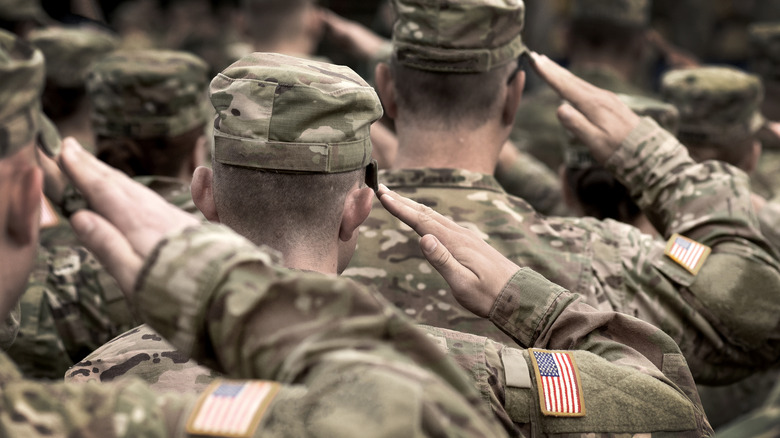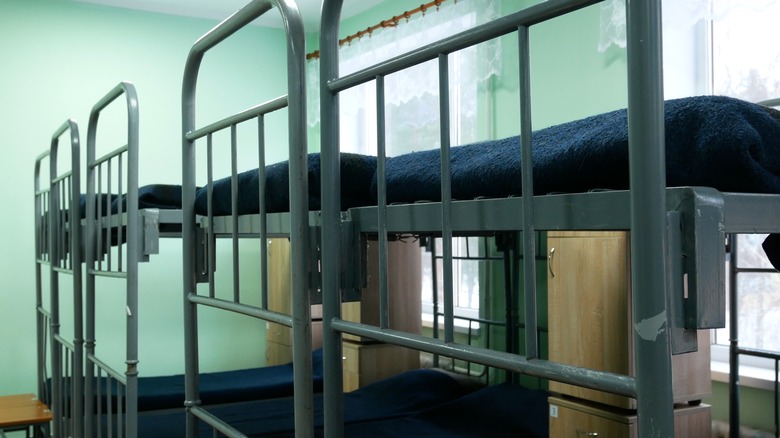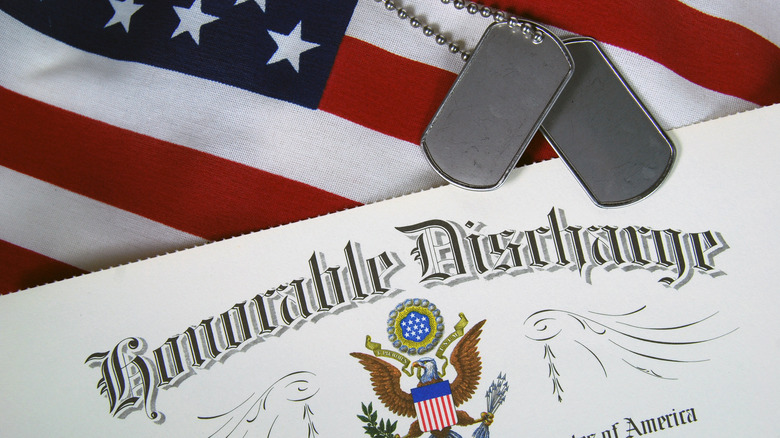The Truth About Jeffrey Dahmer's Time In The Military
Serial killer, rapist, cannibal, necrophile: All of these descriptions and more have been accurately applied to Jeffrey Dahmer over the years since his 17 murders came to light in 1991. From 1978 until the day his crimes were discovered, Dahmer committed horrifying, ghastly acts straight from the most lurid horror film: luring men back to his apartment, brutally killing them, sexually violating their corpses, carving them up, stowing pieces in the fridge, and arranging genitals, skulls, and other body parts around his apartment like a demented museum exhibit (via Biography). He was convicted and given 16 consecutive life sentences. Two years after his incarceration, Dahmer was beaten to death by a fellow inmate in 1994, as History describes.
Dahmer is a case study of many things: media portrayals of the most wayward human behavior, the interaction of early childhood experiences and innate disposition, and of course, psychopathology and substance abuse. That last point is critical to understanding a particular phase of Dahmer's life, after his first murder and before his subsequent murders: his time in the U.S. Army.
Mere weeks out of high school, Dahmer beat hitchhiker Steven Hicks with a 10-pound dumbbell and strangled him to death (via People). Around that time, his parents enrolled him in Ohio State University. His alcoholism was already in full swing, and he dropped out after only one term with a GPA of 0.45, as University District History says. That's when he turned to the military.
College dropout turned army recruit
It might be odd to think of Jeffrey Dahmer as a veteran, but it's true. That being said, his time in the military wasn't exactly heroically spent, nor did he put into the job what we might call his best effort. He simply dragged to the army all of the twisted lodestones and psychological self-destructiveness that would fuel his later crimes. And when he left the military, he simply went on his way toward his violent future.
University District History describes Dahmer's time transitioning from student to soldier. After finishing high school, where Dahmer would walk around the halls with a styrofoam cup full of whiskey and feigning epileptic fits (via The World), Dahmer stayed with his parents. He was 18 years old, directionless and without goals, and cared about nothing but drinking. His parents enrolled him at Ohio State University, where he skipped and failed every class except riflery. He kept to himself, sold his blood for money, and was eventually expelled.
And so, Jeffrey's father, Lionel, gave his son an ultimatum: Shape up and get a job, or join the army. Lionel dropped Jeffrey off at the Ohio Bureau of Employment Services, and Jeffrey instead went to a bar and got arrested on drunk and disorderly charges. That's when Lionel, with no alternatives left, drove his son to an army recruiting center. That year in 1978, Jeffrey Dahmer joined the Army for a three-year enlistment as a medic, as Women's Health Magazine says.
If you or anyone you know needs help with addiction issues, help is available. Visit the Substance Abuse and Mental Health Services Administration website or contact SAMHSA's National Helpline at 1-800-662-HELP (4357).
Average soldier turned psychopath
As The Akron Beacon Journal reports, Dahmer went through four months of Army basic training at Fort McClennan in Anniston, Alabama. There's no further information regarding his time there. After that, Dahmer underwent medical specialist training at Fort Sam Houston in San Antonio, Texas. Come July 1979, he was shipped off to Baumholder, West Germany, where he stayed until March, 1981. There, he served as a combat medic in the 2nd Battalion, 68th Armored Regiment, 8th Infantry Division. Before becoming a combat medic, Dahmer had originally wanted to become a military police officer.
Dahmer's platoon leader, David Goss, was a clinical specialist. "At the aid station," Goss said, "I'd go back to diagnose a patient, and he was right there with me. Eager to learn." Unfortunately for Goss, Dahmer leveraged his anatomical education into nothing more than the butchery of his victims. Despite Dahmer's apparent enthusiasm, Goss also described him as "an average or slightly above average soldier in his first year." There's no mention of Dahmer's marksmanship as related to his interest in riflery in college.
Judging by Goss' evaluation, Dahmer's first year must have been his best year. Before long, Dahmer moved from "average or slightly above average" soldier to nuisance of the barracks, violent alcoholic, epithet-spewing racist, and outright "sociopath," "psychopath," and "narcissist," as fellow soldier Billy Capshaw says on The Wrap. By the end of Dahmer's second year, the Army, like Dahmer's father Lionel before them, wanted him out.
Rape and abuse in the barracks
Two men, in particular, reportedly fell prey to Dahmer's sexually violent tendencies during his time in the military: Billy Capshaw and Preston Davis. As The Wrap cites, Dahmer "physically beat him [Capshaw]. When Billy complained to those in authority, he was told that he was a 'p****' and was not taken seriously. The severity of the physical abuse increased, and Dahmer used an iron bar, which was part of the apparatus for the bed, to hit Billy across the joints." On the Independent, Capshaw said, "I had probably been raped eight to 10 times, I don't know. He was tying me to the bunk with motor-pool rope. He took all my clothing from me. He would either beat me before he raped me or he would beat me after." Capshaw went to the authorities for a rape kit, but they did nothing. "I was there for another 17 months ... being raped and tortured. They threw me to the dogs."
Preston Davis said that Dahmer was "a very racist individual" who became monstrous when drunk. "Somewhere in that time frame," Davis said of a three-day mission in Belgium, "I was drugged and assaulted. The reason he didn't kill me — he said after I left, 'I should've killed that n***** when I had the chance' — but that was the reason he couldn't kill me: We were out in the middle of Belgium. He had no idea how to get back to Germany."
If you or anyone you know has been a victim of sexual assault, help is available. Visit the Rape, Abuse & Incest National Network website or contact RAINN's National Helpline at 1-800-656-HOPE (4673).
Did Dahmer kill while he was in the military?
With such acts allegedly committed by Dahmer against his fellow servicemen, the question begs, "Did Dahmer commit any other crimes while in Germany?" While we don't have conclusive evidence even to this day, in 1991 the Associated Press reported that German authorities decided to reopen five murder cases in the Rhineland-Palatinate region of the country — the location of Baumholder and its army base — four days after Dahmer's arrest. These victims, however, were women; Dahmer always murdered men. One of the victims was a 22-year-old hitchhiker in a location about 50 miles east of Baumholder, and another was found strangled and stabbed, and dumped in a forest, but not mutilated according to Dahmer's habits.
Nonetheless, state authorities at the time stated that they were investigating any links between Dahmer and these murders, as well as to any murdered or missing men in Germany at all during Dahmer's service. Millie Waters, an army spokeswoman in Heidelberg, Germany, also stated that the U.S. military conducted its own investigation. Showbiz Cheat Sheet reports that German authorities also looked into connections between Dahmer and the murder of a 10-year-old boy.
Even if Dahmer didn't murder any German citizens while in Germany, he did brag about his first murder back in Ohio whenever he drank in the barracks, which was often. On The Wrap, Preston Davis described Dahmer admitting to the 1978 murder of Steven Hicks during drunken, racial epithet-littered rants. No one took Dahmer seriously.
Kicked out, and honorably discharged
During the last six months of Dahmer's military service, as The Akron Beacon Journal reports, Dahmer's platoon leader, David Goss, put Dahmer into an alcohol abuse program. It did nothing. The last two months of Dahmer's service were basically spent as a prisoner. He was restricted to his room, and when not in his room, he was escorted everywhere. He was allowed to eat under supervision, go to the bathroom, and be taken to the Army exchange to buy soap, toothpaste, and deodorant. That's it.
Two years, two months, and 15 days into his service, Dahmer was "found unsuitable for military service due to alcohol abuse" and discharged. And yet, this was considered an "honorable discharge," which means yes, Jeffrey Dahmer — the cannibal, serial killer, and alleged rapist of other Army serviceman — was eligible for veteran's benefits, per the U.S. Department of Veterans Affairs. Army Regulation 600-85, available in full on the Army Publishing Directorate, states that alcohol abuse cannot be used as grounds for dishonorable discharge if evidence is inadmissible; commanders need to conduct and submit official alcohol testing.
On March 24, 1981, Dahmer was sent to Fort Jackson in Columbia, South Carolina, for a debriefing, per Women's Health Magazine. He was given a plane ticket to go anywhere. Unable to face his father, Dahmer chose Miami Beach, got a job at a deli, couldn't pay rent, was evicted, and called his father, anyway. It's believed that it would be six years before he killed again, in 1987.





